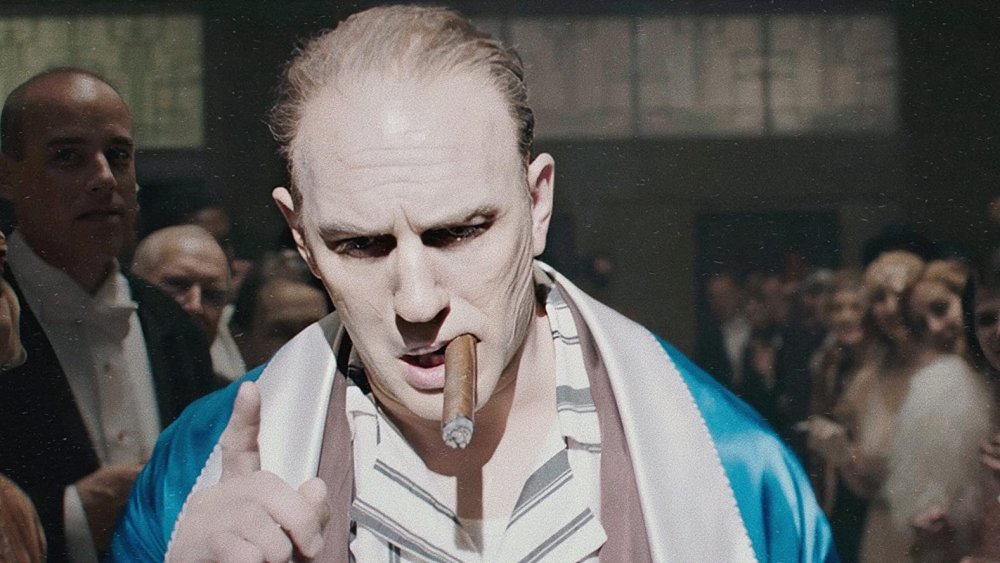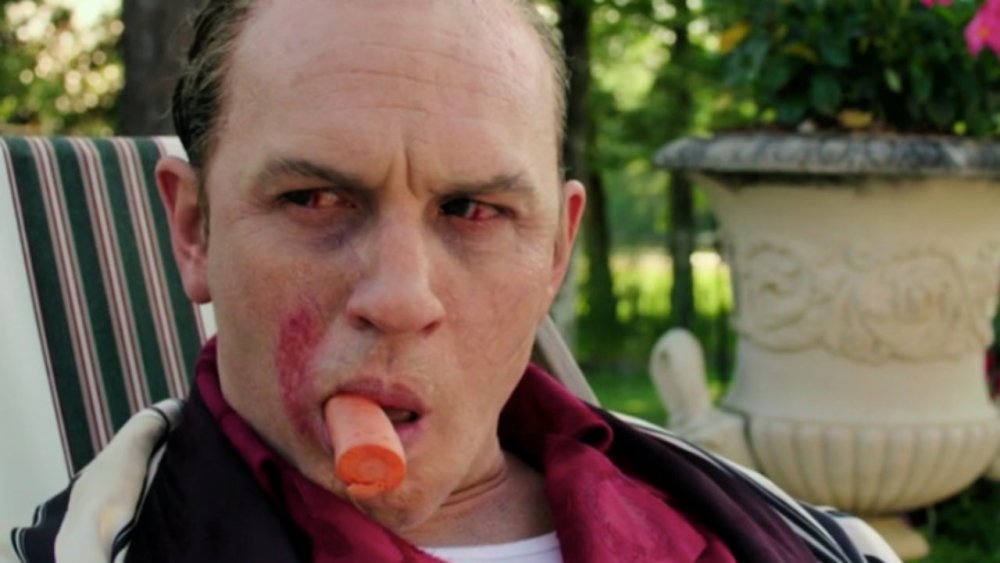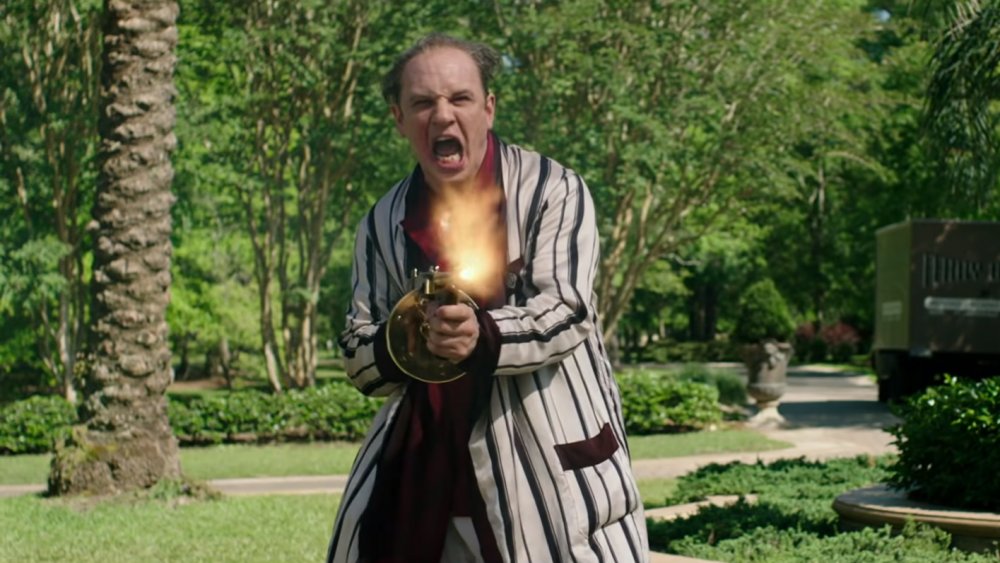Director Josh Trank Opens Up About Capone - Exclusive Interview
If you know Josh Trank's story, it isn't hard to understand why he wanted to make Capone. In 2012, after Trank's found-footage superhero movie Chronicle became a big (and very profitable) hit, he quickly became one of the most sought-after directors in Hollywood. By the time his next film, 2015's critically panned Fantastic Four, hit theaters, that had changed. On-set reports from Fantastic Four regarding Trank's behavior cost him high-profile gigs on Star Wars and Venom projects, while a snarky tweet from the director about studio interference on Fantastic Four threatened to cost him his career.
It's pretty easy to see the parallels to Trank's career in Capone, in which infamous gangster Al Capone is reduced to a quivering mess by disease, and is forced to confront his once-fearsome reputation through radio dramas and flashback-laden hallucinations. It's not a subtle film, and to Trank's credit, he's extremely frank when discussing Capone and his personal connection to the material.
In our exclusive interview, Trank discusses how the Fantastic Four debacle led to Capone, where the film's bizarre tone came from, and why Tom Hardy was the only actor who could play this version of the Chicago bootlegger. Capone is a divisive and strange film, but it's not a thoughtless one. Trank explains why.
How Josh Trank's time on Fantastic Four inspired him to write Capone
Capone is a big departure from Chronicle and Fantastic Four, as well as some of the other stuff you were attached to at one point, like Venom and Star Wars. Was it a conscious decision to move away from science fiction?
Yeah. I mean, there are a lot of different answers that I have, because the seed of this movie really came from a place in my life that I arrived to that I would have never arrived to had I have not gone through what I did on Fantastic Four. My experiences making that movie, the disaster that it turned into, the publicity nightmare, the public humiliation, and all of that. It reshaped my psyche in a way that I ended up writing this film about the last year about Capone's life, as he's battling with his own sense of identity, while his mind is deteriorating. His family is just trying to hold themselves together.
There's more of a long form explanation and discussion about where exactly that came from, but ultimately, it's the only thing I could have written after that, and it's why I'm so grateful that I was able to experience something as bizarre as that was. To go through a public shaming, and a public shaming in my own circle of fellow film-lovers.
Since you brought it up, how exactly did Fantastic Four lead to Capone?
Imagine the thing that you love to do most in the world more than anything, and suddenly everybody starts writing articles about how you suck at it. First, all you want to do after that is prove to everybody that you don't suck at it, that you can do it, and that you have something to say for yourself. But a lot of it just really stems from reading stories about myself that were written in a way that didn't match up with my own personal memory of how things went down, and how those stories that didn't match up with my own memory just became accepted fact to everybody else.
It became its own myth in a way. It's a myth that I didn't feel I identified with, because my memory was different than what was described. So, by the time I got to sending off that tweet, everything went dead silent. I had already been through months of reading so many stories that I became confused myself about what really happened, and that distorted my sense of reality.
So I just started sitting outside, unemployable, branded as toxic as one can be in our business, and being responsible for a corporation losing hundreds of millions of dollars. I just sat out there, just alone in eerie silence. And, eventually, smoking two packs a day, I remembered this little kernel of this story in my head that I read years ago about a time in Al Capone's life, the two years of his life after he was released from Alcatraz due to his failing health. And all I could think about was the eerie silence that he was sitting in. What did it feel like for Al Capone to flip on the radio and hear stories about himself being Al Capone, these radio plays? What would his reaction be to hearing actors playing him on the radio?
My best guess, and my gut told me, is that his reaction would be fear, because how do you contend with an entire lifetime of that's what you're known for, and your present reality is so totally different from that? And that's why I wrote the movie. Scenes have nothing to do with anything about gangsters. It's just Thanksgiving, and he's running around with the kids, and that's where it all came from. It was just an organic thing. I didn't aspire to make a film about Al Capone. It came from somewhere else.
How Josh Trank and Tom Hardy created their unique take on Al Capone
Can you walk me through the work you did with Tom Hardy to develop this version of Al Capone?
Well, the personality is very much in the script, and it's why when Tom read the script. I didn't know Tom before the script found him. I had written the script without any actors in mind, because at the time I was writing I didn't assume I'd ever make another movie again. I didn't really think, "What actors will want to do this?" It was liberating, that feeling of not thinking I was ever going to work again. It gives you the freedom to not care. It's just a crazy experiment that came to my mind, and to go to these places that I never thought would ever get made into a movie.
So when I finished it, I read the script back. And it was like, "Well, if I ever get this made. The only person who could possibly play this character would be Tom Hardy." He's the only actor I know of who can command such power while at the same time catapult himself into these childish theatrics and these absurd places, and then just to walk right back down to earth. As a story, this is also a deconstruction of masculinity, just an unraveling of his pride and his masculinity, and the kind of humility that requires. So I had all those things in my mind. I was just like, "This would be great for Tom Hardy."
And when he got the script, he read it in a day, right away. I was on the phone with him the day after he got it, and we were on the phone for upwards of six hours. It was a day-long conversation. We hit it off instantly. Great guy. So sweet. So interesting and smart. Just intellectual, and artistic, and philosophical. I love to think about making art in the way that Tom loves to think about it.
He just clicked with every aspect of his character, and then I was flown out to London to spend a week and a half hanging with him. And right away, we got into the sort of playful mode of walking around, talking about the scenes. It was a very organic molding of this character. And Tom is very open with his process. He's not method. He just a very skilled actor. And he was just amazing.
So anyway, it was about a year and a half or so before we actually ended up getting to prep in Louisiana. I had spent enough time with him refining things. I'd gone out and done makeup tests with him. We just created that together.
This movie has another strange Tom Hardy voice. Where did Capone's speaking voice come from?
While Tom's voice is Tom's voice, the actual accent of the character seemed like it was hard to find at first, because there's no recording of Al Capone that exists. So instead, I tried to look for recordings of somebody who is from that neighborhood, born around the same time.
I landed on Jimmy Durante. The funny singer, with the funny voice, and the big nose. And he's Italian, he's from Park Slope, Brooklyn, and was born in five years within when Al Capone was born. So that was a guide for what the accent would actually sound like — that's how we landed there. It was very much a collaboration that started with the character on the script, and then just naturally took on a life of its own when the cameras were rolling.


